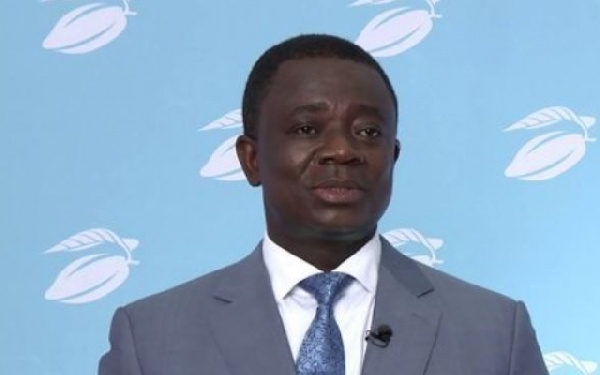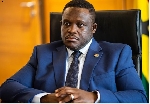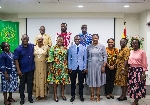Reconstituted Chief Justice-led panel dismisses Dr. Opuni's de novo appeal
 Dr Stephen Opuni
Dr Stephen Opuni
A five-member panel of the Supreme Court, led by Chief Justice Gertrude Sackey Torkornoo, has dismissed the appeal filed by Dr. Stephen Kwabena Opuni, the former COCOBOD Chief Executive, seeking to reverse a ruling by the Appeal's Court in July last year.
The panel, which included Justices Mariama Owusu, Henrietta Mensa-Bonsu, Yaw Darko Asare, and Ernest Gaewu, unanimously upheld the Court of Appeal's decision to continue the trial based on the proceedings conducted by retired Justice Clemence Honyenuga.
It would be recalled that, upon Justice Honyenuga’s retirement, the case was reassigned to Justice Kwasi Anokye Gyimah, who ruled on April 4, 2023, that the trial should start afresh (de novo), considering the need to observe witness demeanour and the fairness concerns raised by the defence. Dissatisfied with this ruling, Attorney General Godfred Yeboah Dame appealed to the Court of Appeal.
Whilst the case was pending before the appellate court and the prosecution dillydallied on reopening their case, Justice Anokye Gyimah was controversially transferred by Chief Justice Sackey Torkornoo to Kumasi. Justice Aboagye Tandoh was then removed from the High Court in Winnabe to replace him.
On July 3, 2023, a three-member Court of Appeal panel led by Justice Philip Bright Mensah, with Justices Jennifer Abena Dadzie and Ernest Owusu Dapaah, overturned Justice Gyimah's decision. The Court of Appeal ruled that the High Court should adopt the proceedings from the trial conducted by Justice Honyenuga, emphasizing that the High Court’s decision to start the case afresh was a misdirection.
Supreme Court Appeal
Dr. Opuni’s legal team, led by lawyer Samuel Codjoe, filed an interlocutory appeal at the Supreme Court on July 7, 2023, arguing that the Court of Appeal erred in its judgment. The appeal contended that criminal trials should start afresh when reassigned to a new judge, a practice that could only be changed by statute.
Several months after the appeal was filed, parties were made to appear before the Supreme Court on 17th January 2024, for hearing.
The court was presided over by Justice Mariama Owusu together with four other Supreme Court judges, namely, Justice Yaw Darko Asare, Justice Emmanuel Yonny Kulendi, Justice George Kingsley Koomson, and Justice Henry A. Kwofie.
The five-member panel made orders for parties to file written submissions.
The orders of the court were to the effect that, the Appellant was to file his written submissions within twenty-one (21) days, the Attorney General’s Department was to file their response within twenty-one (21) days of receipt of Appellant’s submissions after which Appellant had seven (7) days within which to file a reply to the submissions of the prosecution.
Dr. Opuni filed his submission as directed by the court, same as the A-G, but the former declined to reply A-G’s submission.
The matter was then adjourned sine die for the Registry to issue a notice for parties to appear before the court for judgment.
Dr. Opuni’s lawyers received the hearing notice on the 2nd day of May 2024 to appear before the court the following week.
Supreme Court's Controversial Reconstitution
On May 8, 2024, Chief Justice Gertrude Sackey Torkornoo reconstituted the panel hearing Dr. Opuni’s appeal, a decision which drew considerable criticisms. The reconstituted panel, which she presided over, included Justices Mariama Owusu, Henrietta Mensa-Bonsu, Yaw Darko Asare, and Ernest Gaewu.
Only two out of the five justices made it to the new panel.
Lawyer Samuel Codjoe, who felt his client was being treated unfairly, raised an objection to the composition of the panel.
He cited Article 157(3) of the 1992 Constitution, which stipulates that a judge or panel cannot withdraw from a case after hearing arguments until judgment is delivered.
Article 157(3) states: “Without prejudice to clause (2) of this article, no person sitting in a Superior Court for the determination of any cause or matter shall, having heard the arguments of the parties to that cause or matter and before judgment is delivered, withdraw as a member of the court or tribunal, or as a member of panel determining that cause or matter, nor shall that person become functus officio in respect of that cause or matter, until judgment is delivered.”
It was the position of lawyer Codjoe that the Chief Justice was being biased with her action, arguing that the hearing of the matter by a new panel was unconstitutional because the previous panel had already begun hearing the matter,
“As soon as we filed our written submission we were ordered to appear before the panel. As soon as we filed, the panel heard us. In so far as the panel ordered us to appear, it constituted a hearing,” Counsel asserted.
Despite his objection, the Chief Justice-led panel overruled him, stating that the case was not ripe for hearing when the previous panel issued its orders. This decision follows an objection raised against Codjoe’s position by the Attorney General, Godfred Yeboah Dame.
With the procedural objections raised by Dr. Opuni's counsel regarding the reconstitution of the panel to include the Chief Justice and two others, being unsuccessful, the Supreme Court proceeded with the hearing.
With all the parties relying on the written submissions filed on the orders of the previous panel, the Supreme Court set a date for ruling.
Final Decision
On June 19, 2024, the Supreme Court dismissed Dr. Opuni's appeal, ruling that the Court of Appeal was correct in directing the High Court to adopt the previous proceedings. The Chief Justice emphasized that the request to start the trial afresh was without merit.
Meanwhile, the Attorney General Godfred Yeboah Dame has stated that his office has drafted a bill aimed at improving the country’s criminal jurisprudence.
One of the provisions in this bill, he noted, will address issues like the adoption of proceedings in the event a trial judge cannot conclude a matter.
Supreme Court’s Position in 2023
Writing a decision of the Supreme Court in the Republic vrs High Court (Criminal Division) ex-parte Stephen Kwabena Opuni on January 24, 2023, Justice Dotse stated:
“The Supreme Court did not mention its application to the criminal cases. There is also no specific legal provision on whether part heard trials must start de novo or be adopted by the new Judge. The practice for now is that, in criminal trials, the practice is to start trials de novo.
“Perhaps the time has come for this problem to be reviewed, This is because, if as a country we are to make some progress in the prosecution of criminal cases, especially corruption related cases pursuant to the Article 19 provisions of the Constitution 1992, then the bold step has to be taken to introduce sweeping reforms in this part of our criminal justice. We therefore appeal to the Chief Justice to urgently consider reforms in this part of our criminal justice.”
Meanwhile, a cross section of Ghanaians are asking whether the law applies differently when it comes to Dr. Stephen Opuni?
Background of the Case
Dr. Opuni, along with businessman Seidu Agongo and Agricult Ghana Limited, faces 27 charges including defrauding by false pretences, willfully causing financial loss to the state, corruption by public officers, and contravention of the Public Procurement Act in the purchase of Lithovit liquid fertilizer between 2014 and 2016.
Source: Classfmonline.com
Trending News

Gov't to track down illegal mining excavator owners – Defence Minister
03:38
Samuel George affirms commitment to Ghanaians over telecom industry pressures
12:06
Edem Agbana: Ketu North MP reaffirms his commitment to education, infrastructure, transforming constituency
18:09
NPP activist only meant well for Vice President in Facebook post-MP
14:08
V/R: Our people are hungry for dev’t, let's rise above litigation – Edem Agbana urges traditional leaders
17:32
Agongo: Akufo-Addo gov't 'persecuted' me for 8 years due to 'backward thinking' rooted in prejudice
10:49
Weija-Gbawe MP cautions Ghana Water over 'careless' Weija Dam spillage
06:11
Defence Minister vows decisive action in galamsey fight: “We will talk less and act more”
09:27
Health Minister pushes for online nursing admission process to ease burden on applicants
04:45
453 Blue Water Guards pass out to bolster fight against illegal mining in water bodies
09:01



